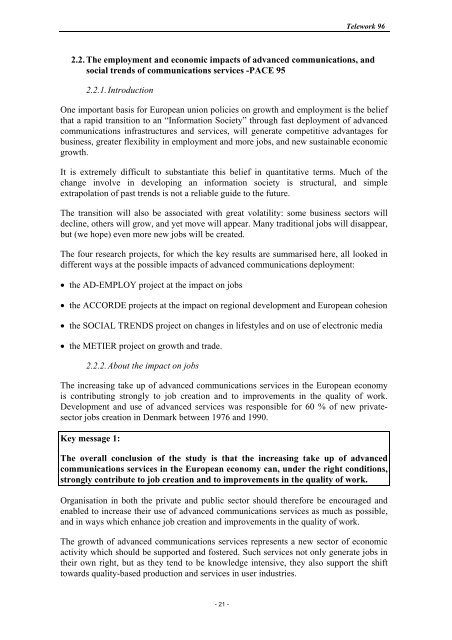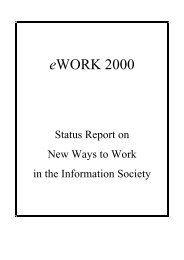1996 - European Telework Week
1996 - European Telework Week
1996 - European Telework Week
- No tags were found...
Create successful ePaper yourself
Turn your PDF publications into a flip-book with our unique Google optimized e-Paper software.
<strong>Telework</strong> 96<br />
2.2. The employment and economic impacts of advanced communications, and<br />
social trends of communications services -PACE 95<br />
2.2.1. Introduction<br />
One important basis for <strong>European</strong> union policies on growth and employment is the belief<br />
that a rapid transition to an “Information Society” through fast deployment of advanced<br />
communications infrastructures and services, will generate competitive advantages for<br />
business, greater flexibility in employment and more jobs, and new sustainable economic<br />
growth.<br />
It is extremely difficult to substantiate this belief in quantitative terms. Much of the<br />
change involve in developing an information society is structural, and simple<br />
extrapolation of past trends is not a reliable guide to the future.<br />
The transition will also be associated with great volatility: some business sectors will<br />
decline, others will grow, and yet move will appear. Many traditional jobs will disappear,<br />
but (we hope) even more new jobs will be created.<br />
The four research projects, for which the key results are summarised here, all looked in<br />
different ways at the possible impacts of advanced communications deployment:<br />
• the AD-EMPLOY project at the impact on jobs<br />
• the ACCORDE projects at the impact on regional development and <strong>European</strong> cohesion<br />
• the SOCIAL TRENDS project on changes in lifestyles and on use of electronic media<br />
• the METIER project on growth and trade.<br />
2.2.2. About the impact on jobs<br />
The increasing take up of advanced communications services in the <strong>European</strong> economy<br />
is contributing strongly to job creation and to improvements in the quality of work.<br />
Development and use of advanced services was responsible for 60 % of new privatesector<br />
jobs creation in Denmark between 1976 and 1990.<br />
Key message 1:<br />
The overall conclusion of the study is that the increasing take up of advanced<br />
communications services in the <strong>European</strong> economy can, under the right conditions,<br />
strongly contribute to job creation and to improvements in the quality of work.<br />
Organisation in both the private and public sector should therefore be encouraged and<br />
enabled to increase their use of advanced communications services as much as possible,<br />
and in ways which enhance job creation and improvements in the quality of work.<br />
The growth of advanced communications services represents a new sector of economic<br />
activity which should be supported and fostered. Such services not only generate jobs in<br />
their own right, but as they tend to be knowledge intensive, they also support the shift<br />
towards quality-based production and services in user industries.<br />
- 21 -








